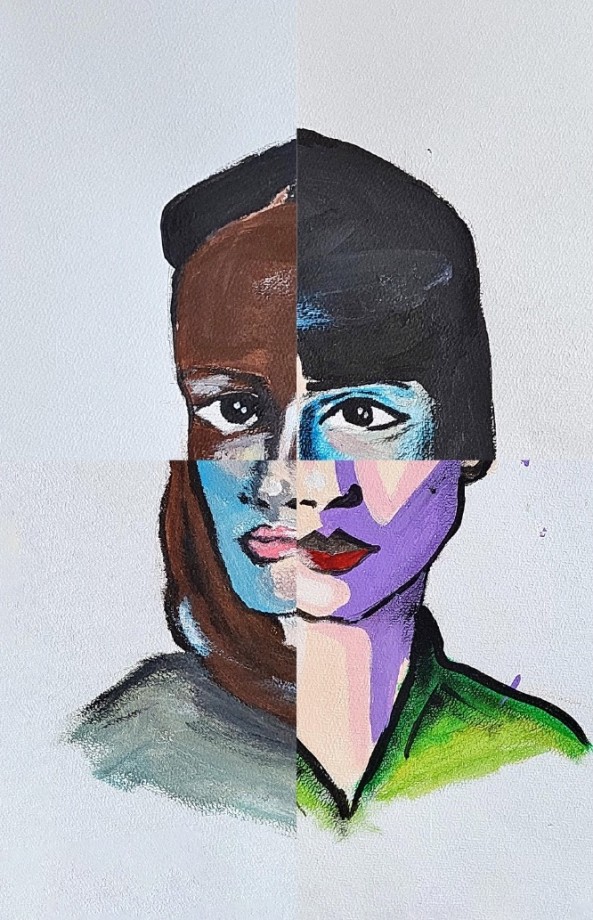
Introduction
Coping strategies and consequences for women who have experienced racism
The realities of the women interviewed are told in the form of biographical case vignettes. All elements of the following stories are taken from the interviews with the women. However, they have been mixed and interwoven in order to preserve the anonymity of the interviewees.
The biographies of many women with a history of migration, including refugee women, are characterised by prolonged periods of strain and stress, an accumulation of serious critical life events and, in some cases, traumatisation. As a result, those affected experience a deep-seated feeling of helplessness and the need to always be on their guard, as their own environment is perceived as unsafe. Women who have had to leave their country of origin are also challenged by feelings of alienation, marginalisation and grief for lost loved ones, skills and opportunities.
Racism and discrimination intensify these feelings and can lead to persistent mistrust, discomfort, but also to hopelessness, fear and despair. Many women with a migration and refugee history are given the message “You are not welcome” or “You are not right the way you are” through racist comments. These are painful experiences that are often accompanied by frustration, doubt and uncertainty. All of this not only has an immense impact on the self-esteem of those affected, but can also lead to crises and cause mental illness. Experiences of racism and discrimination exert an additional negative influence on people who are already under great emotional strain, making it more difficult and sometimes impossible to find a home in the new country. Women with a family history of migration are also denied membership of German society in everyday life because of their name, appearance or religion. All affected groups develop coping strategies to deal with the derogatory behaviour of members of the majority society and their experiences of racism - in order to gain or regain the ability to act.
The following case vignettes reflect the experiences of women from Mecklenburg-Western Pomerania facing racism and offer insights into the coping strategies of those affected.
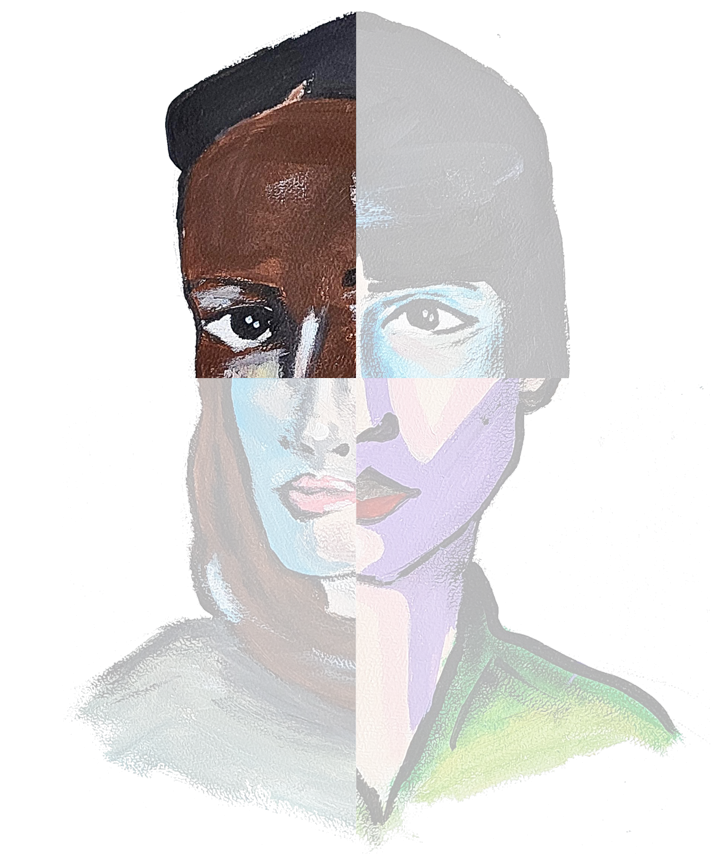
Case 1: Gabuschka, 23 years old, Neubrandenburg
Case 1: Gabuschka, 23 years old, Neubrandenburg
I'm sitting in a large hall. A man in front of me is giving a lecture. A lecture on right-wing extremism and racism in Mecklenburg-Western Pomerania. I listen and have to admit to myself: He makes me very sad, maybe even a little angry? What did he say again? Not so many problems here? Are we doing "very well" compared to the other new federal states? The AfD is not so strong here? Only almost 18% of the seats in parliament? And we have almost defeated right-wing extremism in MV because there are so many counselling centres?
I am trying to stop listening, I can hardly stand being in this room. He's done it again! He is silent about the fact that there is racism here too. Of course, there are certainly no problems for him! But I don't dare say anything, everyone else in the room thinks the man is funny and competent.
I have to think of my mum and grandma. We came here 20 years ago. As ethnic German immigrants. My grandma always said: first I was German all my life, and now I've been Russian for 20 years. I remember that we always had very little money at home. My family had almost nothing. We were already poor in Russia and even poorer in Germany. My mum was a teacher in Russia and worked as a cleaner in Germany. My grandmother worked in Russia as the head of a school, but she was never allowed to work here in Germany. Those were bad times for us, I always had to do the cleaning work with my mum in a company in the afternoons until the evening, and that really wasn't a nice childhood.
I know from the stories that we lived in the house with a lot of racist people. Someone once set fire to my pram in the house because he or she didn't want us as neighbours. I wasn't in the pram, but can you imagine the impact of this attack on our relations? My mum and grandma were so scared, day in, day out, they almost turned the whole flat into a fortress. To this day, my grandma never goes out on the street on her own, only accompanied by us. She doesn't feel safe. Until today!
I forgot how to speak as a child. Yes, really, I forgot the language. We always spoke Russian at home, then we came to Germany and suddenly we had to speak only German. I just kept quiet for four years, I was simply speechless. To this day I can hardly stand my mum's accent - I always think to myself, finally speak Russian again, I can hardly understand you! And that was probably also the problem when I was little. I could no longer speak Russian, but I couldn't speak German either. Later I went to kindergarten, but I wasn't able to learn German very quickly. I was lucky at school because a teacher believed in me. To this day, I hardly dare to speak, even though I speak German without an accent and studied here.
I haven't learnt Russian and only understand it partially. My mum has learnt German, but not well enough for us to have a really long and good conversation. Our relationship is suffering as a result, which is such a shame! I think of all the other migrants and ethnic German immigrants and wonder how they are doing with their languages and with the language change. Will they feel at home here or will they always think of themselves as strangers, like me? I don't know, but I hope that in future there won't be so many people talking about democracy and racism who haven't experienced racism, but more so those of us who have a lot to say on the subject.
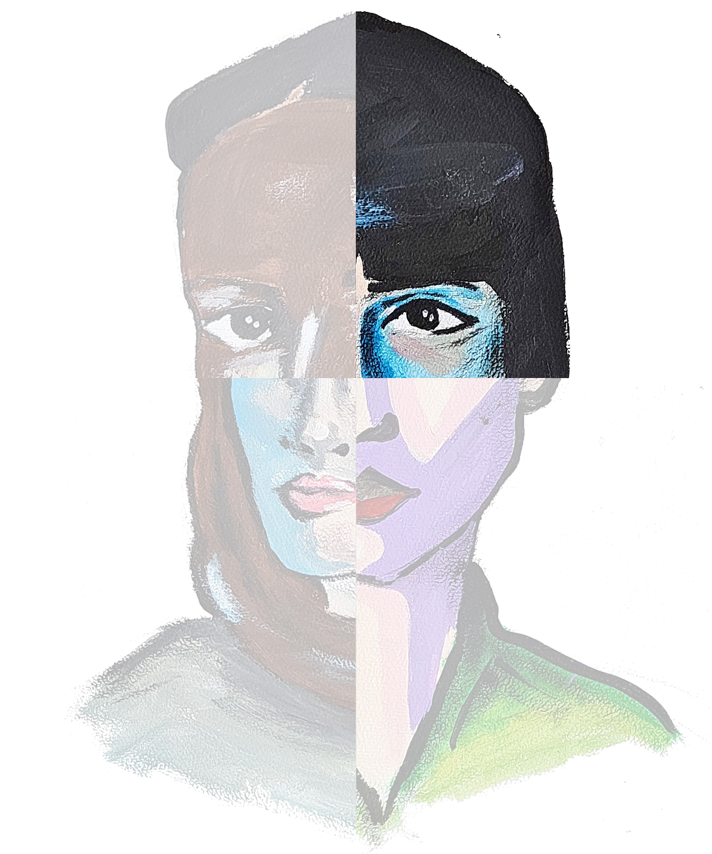
Case 2: Lumya, 47 years old, Stralsund
Case 2: Lumya, 47 years old, Stralsund
I am a very ordinary woman. I have children, I've been married for 19 years, I work. My everyday life is nothing special. I try to juggle family and work. Yes, I sometimes manage it more and sometimes less, just like everyone else. I like to go on holiday, I like to read and I don't do enough exercise, that just falls by the wayside. Actually, I'm just like everyone else, I have good days and bad days. I also worry about my children or my marriage, but who doesn't have these worries? But I'm probably a bit different, at least that's what I hear from time to time.
I can rarely talk about my worries. My headscarf is often more interesting than me. I've already been asked if I'm not too warm under my headscarf or if I go for a shower with it on. People stare at me at the pedestrian crossing and I've even been spat at. I lower my eyes, trying not to attract attention. I want to do everything right, that's really important to me. I expect the same from my children, I don't want them to stand out in a negative way. They should always give their best. I try to ensure that their lunch boxes are always filled with healthy food and that their clothes always look immaculate. I iron everything so that nobody can say that my children look untidy. They have a lot of hobbies, which is important to me. Nobody can say that they are not well integrated. Actually, I hardly think about anything else. That also keeps me up at night. I lie awake and ask myself, have I done something wrong? Have I given enough? I go through everything, every situation, I want to stay in control. But I also realise that it's getting harder and harder.
The harder I try to make everything perfect, the more I realise that it doesn't help. I often don't have the strength, I feel helpless, but perhaps you've experienced that too? Perhaps you've experienced the situation where it's your child's birthday, you make beautiful invitations for their school friends, prepare games, but no child accepts the invitations. Have you experienced that? Do you know how bad it is when you can't do anything? Your child is sitting in front of you and crying because no one is coming to their birthday party. What should I do? Go to all the parents' houses and say, "We are not terrorists! "? My child wanted an operation for their birthday. An operation that makes my child white. I want to be like everyone else, said my child. What do you say as a mother? How do I react?
I'm already doing my best. We pay our taxes, we are educated people and we try to make our front garden bloom and keep it tidy. But it's not enough. It is not enough. It is never enough. Sometimes I'm so sad that I have a bad headache, even a toothache. The doctors can't find anything, they say everything is fine.
The fear for my children is unbearable. My children have already been threatened with a knife or chased simply because they wanted to play football with other children. I also have other fears. Can I continue to work in my job? It was already very difficult to get this job. I was lucky. But I also work hard to show that I deserve it. I'm the first to arrive and the last to leave, I never record my overtime. I take on all the tasks that my colleagues don't want to do. But the political climate is coming to a head. If there are job cuts, will I be the first to go? How will I find a new job? But other women know this too. All women who have children know this pressure. To be successful, to never be sick, to persevere.
All of this concerns me, but how can it be addressed? How do I talk to my children about this? How do I share my worries with my partner? He has enough other problems. I get up in the morning, take my children to school, go to work and enjoy reading and going on holiday. I'm just like you. Right?
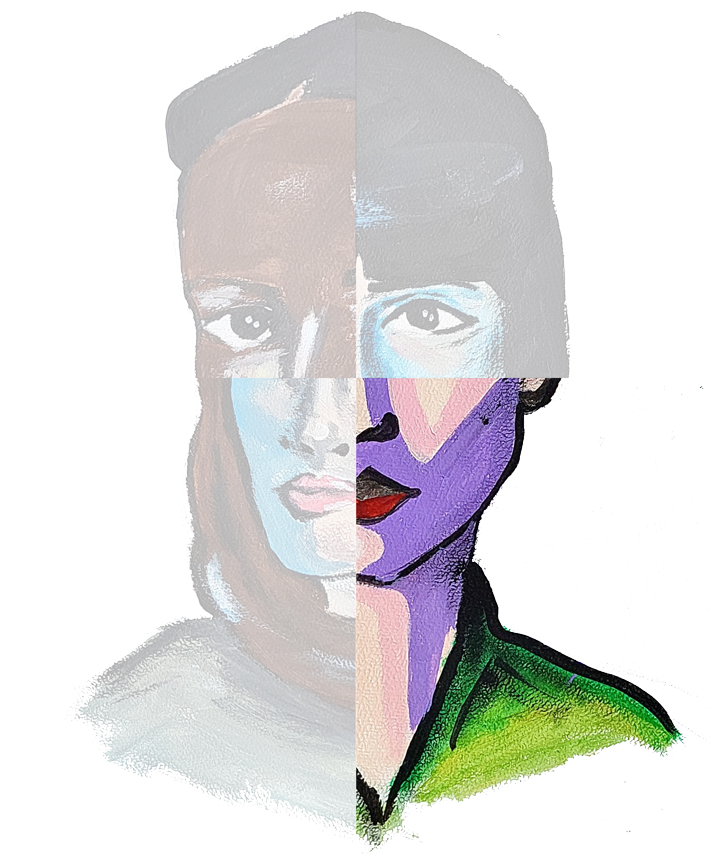
Case 3: Dascha, 38 years old, Wismar
Case 3: Dascha, 38 years old, Wismar
I wake up and hope that the day will pass quickly. I work as a teacher, I have a German class. In other words, children who do not yet speak German, children with a migration or refugee history. I'm so exhausted every day, I have to think about how much longer I want to do it. I got the DaZ class because I'm a migrant. We are called the "Kanak class". So the migrant should join the migrant women. Wow. Even at university I was asked several times why I wanted to study here, why I wanted to work as a primary school teacher if I wasn't German. Yes, why do you want to teach English if you're not English? To date, I have not received an answer. I've arrived in the kitchen and my son is getting the lunch boxes ready, one for me and the other for himself. "I've packed you some biscuits, it's good for your nerves," he laughs. I'm very enthusiastic for a short time, but it soon passes: "You have to teach the foreigners, it takes strength! " I look at him briefly and ask: "And what are we? Are we something else?"
He looks at me and says: "Of course! We are different. We have adapted, but these foreigners don't want to. " I fee like crying for a moment. "You can't be serious! We also have a migration history , you should never forget that! " We both have to go to school, no more time for discussion. We both realise that we have touched on a taboo subject. I ask myself, what have I done wrong that my son can even think like that? Is it the language? I deeply regret that I didn't teach him my mother tongue. I was still young when he was born. I was still studying myself. The birth was a horror for me; during the birth, I was asked again and again whether I spoke German, but no matter what I said, nobody spoke to me. Everyone just wanted to talk to my German husband. My son was a classic screaming child, I didn't know what to do. I was so homesick, I missed my family and friends so much. I was (and still am) so lonely!
Even later, I repeatedly avoided the relationship and closeness with my son. It was so painful for me! I wanted him to become German, but at the same time, I didn't want to let him. Simply crazy! The time with him when he was a child was hard for me to bear. I was afraid to go out with him, he always shouted so much, and people always said: "You see, the migrants always have so many children, but they don't care at all! Who knows what she has done to him again. " I was so sorry that I know German, otherwise at least I wouldn't have understood it. I knew I had to become German! I learnt German so diligently, I only adopted German traditions, I got involved in clubs and got a dog. My son is now 13 and I have so many regrets because it feels like I've lost him. Even when I go home with him, I'm always afraid that he'll behave too German and that my family will move even further away from us. Due to the stress of being "not enough" or "too German", I didn't have any more children, I simply couldn't get pregnant, although we are both healthy as a couple.
"Good morning," the schoolgirls shout. "Come quickly! She's having flashbacks again! " my colleague shouts. I already know what to expect. I recognise this image almost every day. A little girl sits under the bench, trembling, disorientated, her eyes misty. I sit next to her and keep saying: "Don't worry, we're safe! " After what feels like an eternity, she can fall asleep with me and we go back to doing German with the other pupils. I can see the despair of the other children, they know exactly how the girl is feeling, they know it very well themselves. The images of war come back to you several times a day; you experience the war over and over again in your head. We all try to stay positive, sometimes we laugh. Yes, I knew it when I got up: The day is going to be very long again and I just want it to end quickly.
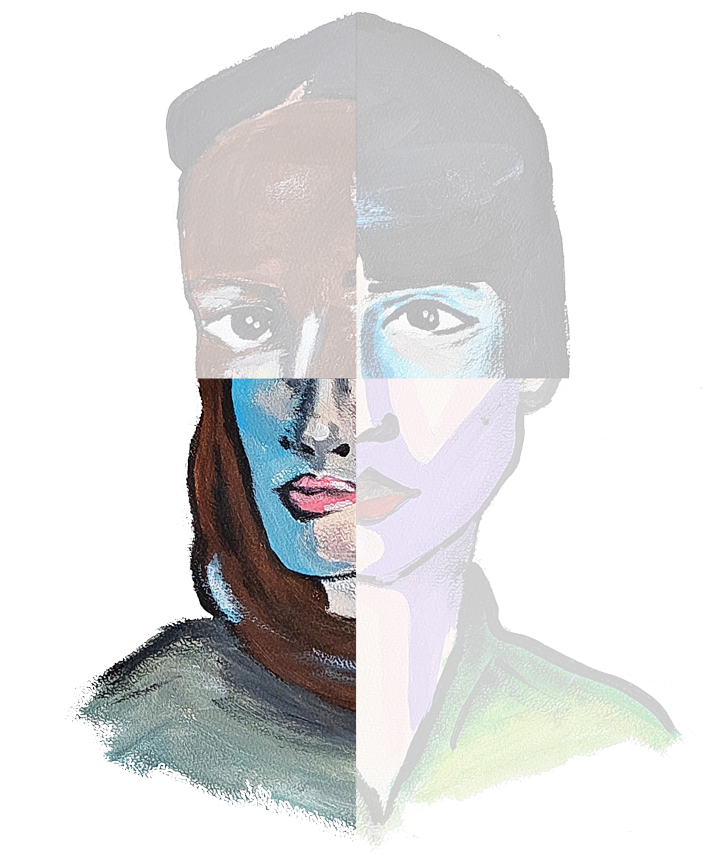
Case 4: Simi, 17 years old, Schwerin
Case 4: Simi, 17 years old, Schwerin
I walk through a crowded street and the whole time I'm thinking: "Don't look up, don't look at the people! " I hate seeing the looks on people's faces when they look at me. "Just a few more steps! " Whew, now I've done it. I'm standing in front of the entrance. I am immediately enveloped by an unbearable, oppressive feeling that eats away at me. It is so heavy that I would like to slide to the ground as if a thousand blocks of cement were pulling me down. It's an indescribably heavy burden that I have to carry around with me, but that's the way it is. Never been any different. I take one last deep breath. I try unsuccessfully to shake off this burden and go to my school. I meet a girl in the corridor who goes to my parallel class: "Hello, my chocolate! " she says with a laugh. I realise how angry this makes me, but I'm too tired to argue about it, there's no point anyway, so I just smile back and keep walking. I'm so sick of it! I always have to stand out because of my skin colour. Nobody sees me! Just my skin colour. I'm always different somehow. Somehow not part of it. Simply foreign.
My dad came to Germany as a child, studied here and works here as a doctor. My mum is a white German woman and has a good job as a speaker in the church. I was born here, and despite everything I am constantly perceived as a foreigner, I am constantly asked: "How long have you been in Germany? What? 17 years? But you speak German very well! " I have to laugh myself, I can't speak any other language than German. It is my mother tongue. But people don't care about that. For them, only their supposed perception, based on prejudices, counts. I can't be anything other than a stranger to them. They would never think of me as a "real German" in any way. Even my class teacher didn't want to give me a grammar school recommendation. She was afraid I might have difficulties with German. Ridiculous. They also treated other children with a migration background in the same way. Anyone who does not appear German enough is automatically categorised for the Mittlere Reife. I went to grammar school against all odds, but why does it always have to be a struggle? Will I ever be able to stop having to fight?
Lessons are about to start. I sit and quickly read through my WhatsApp messages. I'm very worried about my friends from Turkey. I really like them, they are always ready to help, support and care about other people. They are afraid for their mother, who was tortured and raped in prison. She has hardly spoken since then. They do everything they can to make her feel better, but so far without success. They do so much for others, yet they have their own traumas from their experience as refugees. I don't know how they put up with it. I can't even imagine that. And now the family is threatened with deportation! I am so glad that I am only a Black person, that I have a German passport, that I am German. But now I have to concentrate on my lessons, I have to be better than all the "normal children", that's what my father keeps telling me. Don't stand out, fit in and be the best.
Fear always resonates.
